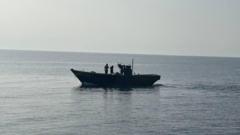Yoon Suk Yeol, former president of South Korea, has been rearrested following a failed martial law attempt that led to his impeachment. He is accused of leading an insurrection and could face severe penalties if convicted.
Former South Korean President Yoon Suk Yeol Rearrested Amid Martial Law Controversy

Former South Korean President Yoon Suk Yeol Rearrested Amid Martial Law Controversy
South Korea's ex-leader faces serious charges over last year's attempted martial law that shook the nation.
In a dramatic turn of events, former South Korean president Yoon Suk Yeol has been rearrested due to his involvement in last year’s controversial martial law declaration, which triggered national unrest. Impeached in April over his actions, Yoon introduced military rule for a brief period in December, leading to significant political upheaval.
A senior judge at Seoul's Central District Court authorized the arrest warrant on Wednesday, citing concerns that Yoon might destroy evidence related to the case. Yoon, who made history as the first sitting South Korean president to be detained, now faces serious charges including leading an insurrection that attempted to impose martial law.
During a lengthy seven-hour court hearing, special counsel presented arguments advocating for the warrant based on five key allegations, including Yoon’s purported infringement on the rights of cabinet members by excluding some from crucial meetings prior to the martial law announcement.
Initially present in court to contest the accusations alongside his legal team, Yoon was subsequently transferred to the Seoul Detention Center as the court deliberated the arrest order. His first arrest occurred in January amidst a tense standoff, with investigators breaching barricades to apprehend him at his residence. Yoon secured release two months later when a court overturned the arrest on procedural grounds, but he still awaited trial on the original charges.
If convicted, Yoon risks facing severe penalties, which could include life imprisonment or even capital punishment. Reports indicate that prosecutors have gathered evidence suggesting that Yoon orchestrated military drone flights over North Korea as a means to provoke a response, strengthening his rationale for the martial law declaration.
In addition to Yoon, other senior officials are also facing charges connected to insurrection and abuse of power concerning the martial law case. Notably, insurrection is one of the limited criminal charges from which South Korean presidents historically do not receive immunity, and with his presidential term concluded, Yoon is now vulnerable to further indictments.
Since Yoon's impeachment, Lee Jae-myung has assumed the presidency, elected in a snap election held in June. Lee, who campaigned on a platform advocating for democratic principles following the crisis, has activated a special counsel to investigate Yoon’s martial law actions and other alleged infractions from Yoon's administration.



















